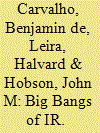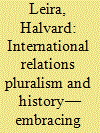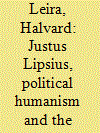| Srl | Item |
| 1 |
ID:
105932


|
|
|
|
|
| Publication |
2011.
|
| Summary/Abstract |
International relations as we know them emerged through the peace of Westphalia, and the discipline of International Relations emerged in 1919 and developed through a First Great Debate between idealists and realists. These are the established myths of 1648 and 1919. In this article we demonstrate how historical and historiographical scholarship has demolished these myths, but that the myths regardless are pervasive in the current textbooks that are used in teaching future IR scholars. Disciplinary dialogue seems to have failed completely. Based on a detailed reading of the myths and their perpetuation, we discuss the consequences of the discipline's reliance on mythical origins, why there has been so little incorporation of revisionist insight and what possibilities there are for enhancing the dialogue.
|
|
|
|
|
|
|
|
|
|
|
|
|
|
|
|
| 2 |
ID:
165444


|
|
|
|
|
| Summary/Abstract |
International relations scholarship typically treats foreign policy as a taken-for-granted analytical concept. It assumes either that all historical polities have foreign policies or that foreign policy originates in seventeenth-century Europe with the separation between the “inside” and “outside” of the state. It generally holds that foreign policy differs in essential ways from other kinds of policy, such as carrying with it a special need for secrecy. I argue against this view. The difference between “foreign” and “domestic” policy results from specific political processes; secrecy begat foreign policy. Growing domestic differentiation between state and civil society in the eighteenth century—articulated through a relatively free press operating in a nascent public sphere—enabled the emergence of foreign policy as a practical concept. The concept served to delimit the legitimate sphere of political discourse from the exclusive, executive sphere of king and cabinet. I explore these processes in Britain and France, important cases with different trajectories, one of reform, the other of revolution. Historicizing foreign policy like this serves to denaturalize the separation between different forms of policy, as well as the necessity of secrecy. Doing so cautions against the uncritical application of abstract analytical terms across time and space. jel code: historical international relations foreign policy conceptual analysis
|
|
|
|
|
|
|
|
|
|
|
|
|
|
|
|
| 3 |
ID:
137603


|
|
|
|
|
| Summary/Abstract |
This article approaches the possibility of achieving pluralist International Relations research through engagements with history/History. There are serious sociological and disciplinary challenges to achieving pluralism, most importantly related to the need to make a mark and a career in one specific discipline and the constant diversification of disciplines. Even so, drawing on the literature of amateurism, understood as engaging in an activity for the love of it, it is argued here that a spirit of engaged amateurism in dealing with history offers an important opportunity for exploring commonalities and fostering pluralism both within the discipline and across disciplinary boundaries.
|
|
|
|
|
|
|
|
|
|
|
|
|
|
|
|
| 4 |
ID:
088347


|
|
|
|
|
| Publication |
2009.
|
| Summary/Abstract |
Justus Lipsius (1547-1606) was among the most influential thinkers of the late 16th/early 17th centuries. His guides for action were highly influential in the establishment of moderate absolutism and what has been called the fiscal-military state across Europe. In this article I explore Lipsian thought in an International Relations context. Special attention is paid to his ideals of discipline, which were meant to order both the ruler and those that he ruled. Dignity, self-restraint and discipline were the recipes for the foreign policy of the prince, while the individual was subordinated to the purposes of the state, and taught to control his own life by mastering his emotions. If not a seminal thinker in his own right, it is necessary to understand Lipsius' thought and influence to be able to fully understand the 17th century theoretical approaches to peace and prosperity and the relative discipline of early-modern statecraft.
|
|
|
|
|
|
|
|
|
|
|
|
|
|
|
|
| 5 |
ID:
060242


|
|
|